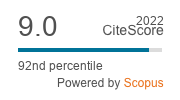Survival and germination rate of Bacillus subtilis C-3102 spores were investigated in a stomach and small intestine model (TIM-1), while the impact of C-3102 cells that had passed through TIM-1 on human colon microbiota was evaluated in a model of the large intestine (TIM-2). The survival of C-3102 spores in TIM-1 was 99%; 8% of the spores had germinated. Effluent of TIM-1 was subsequently introduced into TIM-2 and a micro-array platform was employed to assess changes in the microbiota composition. The effluent, which contained germinated C-3102 cells, increased some Bifidobacterium species and decreased some Clostridium groups. These changes were greater compared to those obtained by adding C-3102 spores directly to TIM-2. The present study suggests that oral doses of B. subtilis C-3102 spores have the potential to modulate the human colon microbiota. This effect may be caused by germination of the spores in the gastrointestinal tract.
Research-Article
Influence of Bacillus subtilis C-3102 on microbiota in a dynamic in vitro model of the gastrointestinal tract simulating human conditions
M. Hatanaka Related information
1 Microbiology and Fermentation Laboratory, Calpis Co. Ltd, 11-10, 5-Chome, Fuchinobe, Chuo-ku, 252-0206 Sagamiharashi, Kanagawa, Japan
, Y. Nakamura Related information1 Microbiology and Fermentation Laboratory, Calpis Co. Ltd, 11-10, 5-Chome, Fuchinobe, Chuo-ku, 252-0206 Sagamiharashi, Kanagawa, Japan
, A.J.H. Maathuis Related information2 Dept. Biosciences, Pharmacokinetics and Human Studies Group, TNO Quality of Life, P.O. Box 360, 3700 AJ Zeist, the Netherlands
, K. Venema Related information2 Dept. Biosciences, Pharmacokinetics and Human Studies Group, TNO Quality of Life, P.O. Box 360, 3700 AJ Zeist, the Netherlands
, I. Murota Related information1 Microbiology and Fermentation Laboratory, Calpis Co. Ltd, 11-10, 5-Chome, Fuchinobe, Chuo-ku, 252-0206 Sagamiharashi, Kanagawa, Japan
, N. Yamamoto Related information1 Microbiology and Fermentation Laboratory, Calpis Co. Ltd, 11-10, 5-Chome, Fuchinobe, Chuo-ku, 252-0206 Sagamiharashi, Kanagawa, Japan
Beneficial Microbes: 3
(3)- Pages: 229 - 236

Published Online: September 11, 2012
Abstract
Keywords: Bacillus subtilis, C-3102, probiotic, microbiota, gastrointestinal tract model
2022 Journal Impact Factor
5.4
source: Journal Impact Factor 2023™ from Clarivate™

Institutional Offers
For institutional orders, please contact [email protected].
-
A.A. Hibberd, C.C. Yde, M.L. Ziegler, A.H. Honoré, M.T. Saarinen, S. Lahtinen, B. Stahl, H.M. Jensen and L.K. Stenman
-
E.E. Blaak, E.E. Canfora, S. Theis, G. Frost, A.K. Groen, G. Mithieux, A. Nauta, K. Scott, B. Stahl, J. van Harsselaar, R. van Tol, E.E. Vaughan and K. Verbeke
-
K. Venema, J. Verhoeven, C. Beckman and D. Keller
-
E. Arvidsson Nordström, C. Teixeira, C. Montelius, B. Jeppsson and N. Larsson
-
J.E. Haarhuis, A. Kardinaal and G.A.M. Kortman
-
E.E. Blaak, E.E. Canfora, S. Theis, G. Frost, A.K. Groen, G. Mithieux, A. Nauta, K. Scott, B. Stahl, J. van Harsselaar, R. van Tol, E.E. Vaughan and K. Verbeke
-
K. Lippert, L. Kedenko, L. Antonielli, I. Kedenko, C. Gemeier, M. Leitner, A. Kautzky-Willer, B. Paulweber and E. Hackl
-
K. Tsilingiri and M. Rescigno
-
M. Ozen and E.C. Dinleyici
-
Y. Kobayashi, T. Kuhara, M. Oki and J.-Z. Xiao



